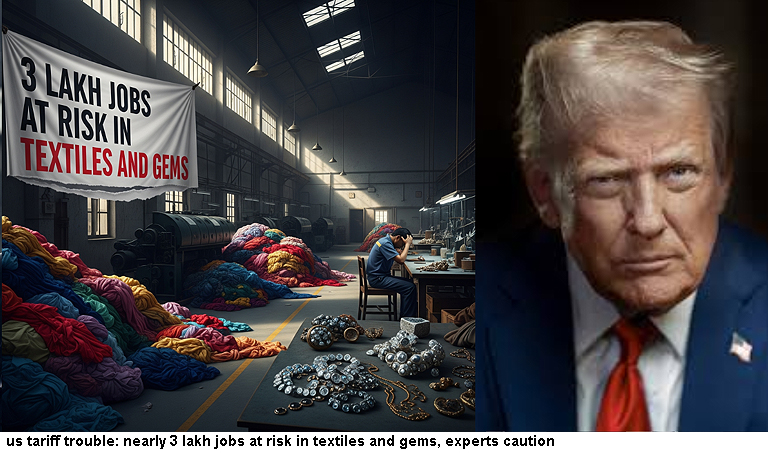
Category: General
Country: India
Region: South Asia
Story by Times Now Digital
18th August 2025
Reading TIme: 2 minutes
The new US tariffs on Indian exports have raised concerns across industries, particularly textiles and gems, with experts estimating that as many as 2–3 lakh jobs could be at risk if the trade restrictions remain in force for an extended period. While some staffing specialists foresee a significant impact, others argue that India’s strong domestic demand and trade diversification could soften the blow.
Tariffs and Job Risks in Focus
According to R P Yadav, Founder & CMD of Genius HRTech, sectors like textiles, auto components, agriculture, and gems & jewellery are among the most vulnerable. Being labour-intensive, textiles could alone lose nearly 1 lakh jobs if tariffs remain for over six months. Gems hubs such as Surat and Mumbai’s SEEPZ are also at risk of widespread employment disruptions due to shrinking demand and rising costs in the US market.
Yadav warned that MSMEs (micro, small and medium enterprises), which dominate these export-linked industries, will bear the heaviest shock.
Balancing Factors: Domestic Demand & Trade Diversification
In contrast, Balasubramanian Anantha Narayanan, SVP at TeamLease Services, believes the broader Indian job market may be less vulnerable than feared. “At this point in time, we aren't seeing any signs of a slowdown or loss of jobs… Our jobs are largely in service of domestic demand too, with the exception of some sectors like ITeS,” he told PTI.
He highlighted that India’s exports to the US stood at USD 87 billion, accounting for only 2.2 per cent of GDP, limiting exposure. Critical industries like pharma and electronics remain unaffected for now. Narayanan also pointed to positives such as India’s recently concluded FTA with the UK, arguing that India can redirect exports to other global markets.
Wider Industry Concerns
Aditya Mishra, CEO of CIEL HR, said exporters across electronics, gems and jewellery, textiles, auto components, leather, footwear, shrimp, and engineering goods are facing uncertainty. Even sectors outside the direct tariff ambit—such as pharma—are seeing ripple effects from costlier upstream chemicals.
Mishra noted that companies are already taking cost-control measures:
-Freezing hiring
-Streamlining production
-Cutting discretionary spends
-Putting pressure on temporary and contract roles
He warned that these steps could hit shop-floor workers, artisans, sales staff, logistics workers, and MSMEs in supply chains hardest.
Spillover to IT and Global Capability Centres
Mishra also flagged potential spillover risks for IT services and GCCs (Global Capability Centres). With IT hiring already slow, prolonged tariff tensions could delay recovery and shrink India’s market share in the US.
The impact of US tariffs on Indian jobs remains uncertain. While experts like Yadav warn of immediate risks to nearly 3 lakh workers, others stress that India’s strong domestic economy and trade partnerships could provide a cushion. Until trade negotiations progress, industries closely tied to US exports—particularly textiles and gems—face an uneasy wait.
Courtesy: msn.com
Copyrights © 2026 GLOBAL TEXTILE SOURCE. All rights reserved.